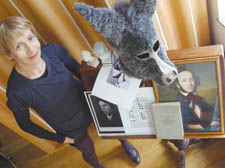|
|
 |
| |

Shelia Hayman at her Camden Town home with portrait of Felix Mendelssohn |
Molly, Mendelssohn and how to conduct harmony at home
Sheila Hayman’s latest novel explores eco-domesticity while her film looks at a famous ancestor’s life, writes Ruth Gorb
Mrs Normal Saves the World. By Sheila Hayman. Published by Lulu.com
THERE you are, a woman of high ecological principles, with every intention of saving the planet – and you find that your family won’t play ball.
Your husband doesn’t fancy green tea, your little boy demands strawberries grown a million air miles away, your stroppy technologically obsessed teenage daughter pours scorn on any suggestion of a simple life: “Embroidery! God Mum, you can’t even do a zip?”
This alarming creature is completely made up, says eco-novelist Sheila Hayman. Her own 12-year-old daughter has a brain and wants to do something with her life.
“I’m just rehearsing for her adolescence,” says Hayman. “I try and hold my nerve.”
Fictional Molly (Doc Martens, wild black hair, vile temper and worse language) is a terrifying presence in Hayman’s most recent novel, Mrs Normal Saves the World.
Hayman has made a speciality of family life writ-large; Small Talk and Are We Nearly There Yet? are previous hilarious horror stories and one suspects they have their roots in home life in Camden Town. Her own lot, she says diplomatically, are very strong-minded: “They have their own agenda – and so do I.”
Hayman took to writing novels after her first child was born. Careering around the world making films was not compatible with child-rearing. It was great while it lasted, she says. “I spent 20 years making films – the sort that don’t get made any more,” says Hayman. “I was a spoilt child of the 80s. I did various films for Horizon, and got prizes, including a Bafta. One film was about big corporations in the US, which are like churches, and what their creeds are which, given my background…”
Which is, to say the least, colourful. Hayman’s great-great-great-great uncle was the composer Felix Mendelssohn.
He was Jewish, but decided he could be a Christian as well and there was much inter-marriage in the family. Mendelssohn’s music became deeply embedded in German culture, to such a degree that when Hitler made attempts to ban the composer’s Wedding March, he failed.
Hayman’s German-Jewish father was brought up as a Lutheran at school in Germany, married a Quaker and became a Quaker. When his wife died he married an Iraqi and became a Muslim, and when she died he married a third time – to a lapsed Catholic.
Where does this leave Sheila Hayman? She takes her children to the Quaker Friends Meeting House in Hampstead, and that’s about it.
Her education was equally fragmented. Brought up by intellectuals (her father was a pure mathematician), she decided that it would be “interesting” to read Chinese at university. “I discovered that while all my contemporaries were having fun, I was in the language laboratory making Chinese noises – I switched to history,” says Hayman.
She got three job interviews when she graduated: with The Times, Reuters, and the BBC. She chose the BBC, and had a fantastic time. And now, two children and three novels later – plus a few sidelines such as being a Chinese interpreter, a Fulbright Fellow, a fiddle player in an Irish band, and the official necrologist of the 1996 Oscars – she is back in the film business. This one has the snappy title Mendelssohn, the Nazis, and Me.
Hayman is, despite the laughs, deeply and personally concerned about the environment and the parlous state of the world.
She does what she can: all the money she makes from the film is going to the charities Tree Aid and Practical Action, and she runs a therapeutic writing group at the Medical Foundation in Finsbury Park. “All the clients have been tortured, and they’re all so brave and funny and creative, it’s a great privilege to work with them,” says Hayman.
And Iris, the sad green campaigner heroine in her book – and she really is a heroine – struggles on despite almost destroying her marriage, and she still dreams of a world where there is no concrete or plastic bags or Barbie karaoke sets.
How does Hayman’s own family measure up?
“My husband has been very forbearing,” she says. “He puts up with no more plane travel and gruesome local vegetables. The children? They’re resigned. We do have the odd illegitimate treat and here they are, bouncing and healthy, so I don’t think I’ve done them any harm.”
•
|
 |
|
 |
 |
|
 |
|


